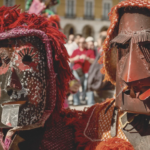The Quirky Customs of Portugal’s Caretos: Mysterious Masked Figures
Portugal, with its rich cultural tapestry, boasts a variety of traditions that have stood the test of time. Among these, the enigmatic and lively tradition of the “Caretos” takes center stage. These masked figures, donned in vibrant costumes, play a significant role in the country’s cultural landscape, especially during the winter festivals.
Unveiling the Mystery: Who are the Caretos?
The Caretos are traditional figures hailing from northeastern Portugal, particularly from the region of Trás-os-Montes. These mysterious characters come to life during the winter months, making appearances at various festivals and celebrations. What sets them apart are their elaborate and colorful costumes, dominated by oversized, devilish masks that conceal the identity of the wearer.
The Origins: Tracing the Roots of Caretos
To truly understand the significance of the Caretos, one must delve into their historical roots. The tradition is believed to have ancient origins, rooted in a mix of pagan and Christian influences. Many locals claim that the Caretos have been part of their cultural heritage for centuries, with the ritualistic performances handed down through generations.
The Caretos are closely associated with winter festivals, particularly the Carnival season, during which these masked figures roam the streets, engaging in playful and mischievous behavior. The performances often involve intricate dance routines, lively music, and theatrical displays that captivate both locals and tourists alike.
The Masks: Craftsmanship and Symbolism
At the heart of the Caretos tradition lies the craftsmanship of the masks. These oversized, vividly colored masks are meticulously crafted by skilled artisans, each bearing unique features that contribute to the mystique of the Caretos. The masks often depict grotesque and devilish faces, with exaggerated features that add to their otherworldly aura.
The symbolism behind the masks is diverse, representing various aspects of folklore, mythology, and local beliefs. Some masks are said to ward off evil spirits, while others embody the playful and mischievous nature of the Caretos themselves. The act of donning the mask is considered a transformative experience, allowing the wearer to embody the spirit of the Caretos during the festivities.
Festivals and Celebrations: Where the Caretos Come to Life
The Caretos make their grand entrance during winter festivals, adding a unique and lively flair to the cultural celebrations. One of the most renowned festivals featuring the Caretos is the Carnival of Podence, held in the municipality of Macedo de Cavaleiros. During this event, the streets come alive with the vibrant colors of the Caretos’ costumes, and the air is filled with the energetic beats of traditional music.
The Caretos actively engage with the audience, dancing and interacting with onlookers, creating an immersive experience that showcases the dynamic and spirited nature of this cultural tradition. The festivals provide a platform for locals to express their creativity, passion, and a deep connection to their cultural heritage.
Frequently Asked Questions (FAQs)
Q1: What is the significance of the Caretos tradition in Portuguese culture?
The Caretos tradition holds immense significance in Portuguese culture as a vibrant and dynamic expression of the country’s folklore. It represents a blend of pagan and Christian influences, showcasing the rich tapestry of Portugal’s cultural heritage. The Caretos bring communities together during winter festivals, creating an atmosphere of joy and celebration.
Q2: Are the Caretos exclusive to a particular region in Portugal?
While the Caretos predominantly originate from the northeastern region of Trás-os-Montes, their influence extends beyond this area. The most prominent festival featuring the Caretos is the Carnival of Podence, which attracts visitors from various parts of Portugal and around the world. The tradition has become a symbol of national pride, transcending regional boundaries.
Q3: What is the significance of the masks worn by the Caretos?
The masks worn by the Caretos are not merely decorative; they carry deep symbolic meaning. Crafted with precision and creativity, these masks often depict mythical and devilish figures. The act of donning the mask is considered a transformative experience, allowing the wearer to embody the spirit of the Caretos during festive celebrations. The masks also serve as a form of protection against evil spirits, adding a layer of mystique to the tradition.
In conclusion, the Caretos tradition stands as a testament to Portugal’s cultural richness and the resilience of age-old customs. The vibrant costumes, elaborate masks, and lively performances of the Caretos contribute to the country’s cultural identity, offering a captivating experience for both locals and visitors alike.

